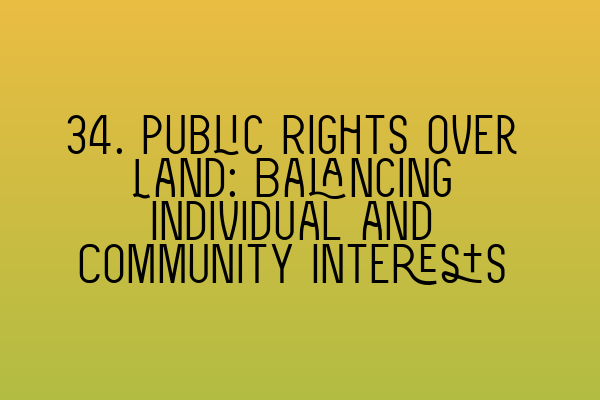**34. Public Rights over Land: Balancing Individual and Community Interests**
Welcome back to the SQE Property Law & Land Law blog! In today’s post, we will be diving deep into the topic of public rights over land and how they are balanced with individual and community interests. This is a crucial aspect of property law that every aspiring solicitor should be familiar with. So, let’s get started!
Public rights over land refer to the various rights and privileges that are granted to the public in relation to certain areas of land. These rights are created to ensure the proper functioning of society and to maintain the balance between individual property rights and communal interests. They play a vital role in upholding the principles of fairness and accessibility within our legal system.
One of the most common examples of public rights over land is the right of way. This allows individuals to pass through a specific piece of land, usually in the form of a footpath or roadway. The right of way serves an important purpose by providing people with convenient access to certain areas, such as parks, shopping centers, and public facilities. It is important to note that the right of way can either be established by law or by custom.
Another important public right over land is the right to light. This ensures that individuals have sufficient access to natural light in their properties. The right to light is particularly relevant in urban areas where buildings are closely situated. It prevents any neighboring constructions from obstructing the natural light source of a property, thereby maintaining a reasonable level of illumination.
Public rights over land also extend to rights such as the right to water and the right to air. These rights safeguard the availability of clean water and fresh air to the general public. They also impose certain responsibilities on property owners to ensure that their activities do not harm the environment or cause pollution that could jeopardize these public interests.
Balancing individual property rights with public rights over land can sometimes be a complex task. Conflicts may arise between the rights of individuals who own land and the rights of the public who wish to access or benefit from it. In such situations, it is the responsibility of the legal system to strike a fair balance that considers the interests of all parties involved.
To achieve this balance, courts often rely on legal principles such as reasonableness and proportionality. These principles assess whether any restrictions imposed on individual property rights are justifiable in light of promoting the greater public good. For example, if building a new development would significantly impact the rights of neighboring property owners, the court may require the developer to undertake certain mitigation measures or provide compensation.
It is also important to consider the role of planning and zoning regulations in balancing public and individual interests. These regulations play a crucial role in ensuring that land use developments are in line with the overall goals of the community. They help prevent situations where individual property rights are excessively favored at the expense of public concerns. By carefully planning and regulating land use, governments can effectively manage and balance the competing interests of individuals and the community.
Keeping this delicate balance requires a deep understanding of property law and the ability to navigate the complexities surrounding public rights over land. Aspiring solicitors must have a strong grasp of legal principles and statutes related to this area. To solidify your knowledge and prepare for the SQE exams, we recommend exploring our SQE 1 and SQE 2 preparation courses, as well as practicing with our SQE 1 practice exam questions and SQE 1 practice mocks FLK1 FLK2. These resources will provide you with the necessary tools to excel in your exams and lay a strong foundation for your future career.
In conclusion, public rights over land serve as an important mechanism for maintaining a fair and accessible society. Balancing these rights with individual property rights requires careful consideration of legal principles and the overall goals of the community. As a solicitor, it is crucial to stay up-to-date with the latest developments in property law and be equipped with the knowledge and skills to navigate complex situations. So, keep exploring our blog for more insightful posts and make sure to check out our related articles on SQE exams and preparation.
